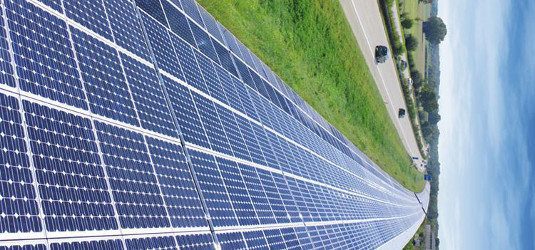The construction of a solar road in France is turning numerous heads due to the novelty value of the project, however, solar experts have a different view, seeing the construction as economically unviable, and actually damaging to the solar industry.
A 340 kW solar road is currently under construction in Normandy, France. It will be one kilometer long, with a surface of 2,800 m2, according to Michel Salion from the Colas-Wattway press team, a subsidiary company of Bouygues S.A. Although advertised on the French Ministry of Ecology website as having the capacity to deliver 17,963 kWh per day, in actual fact it will generate just 767 kWh per day.
In fact, Segolène Royal, French Minister of Ecology, announced that one kilometer of the solar road will deliver enough electricity for 5,000 houses. This is also wrong. With 767 kWh per day – official data from Michel Salion – it will just be able to power 50 French homes. The cost of one kilometer of the solar road is EUR 5,000,000, which works out as EUR 100,000 per each home that is powered by the road.
The erroneous statistics generated a lot of hype all over the world, however, solar experts have offered differing analysis of the project.
“Solar roads in France are much less efficient, and more costly, than PV on rooftops and parking structures, and in PV power plants,” commented Mark Jacobson, director of the Atmosphere Energy Program at Stanford University and founder of The Solution Project.
For Jenny Chase, Head of solar analysis at Bloomberg New Energy Finance (BNEF), “French solar roads seem like a way to subsidize French companies, not a way to make electricity.”
Chase categorically denied the idea of solar roads popping up on four continents, while tweeting in response to a Bloomberg article earlier in the month. While BNEF founder Michael Liebreich, offered an alternative, somewhat satirical, headline: French company gets subsidy to build solar roadway with approximately 170-year payback.
Within the article, Liebreich wrote that the French solar road is “a state-funded experiment with zero chance of becoming commercially viable,” and the “170-year payback is with 0% finance, no maintenance and panels that last 170 years.”
“So these panels, which currently cost EUR 21 per W, will perform substantially worse and have a shorter lifetime than normal EUR 1/W PV. But that’s ok because… they’re made in France?” continued Chase.
Colas said one year ago that the cost of the solar road would be EUR 6 per W. But that was just for the modules, without the Balance of System (BoS) and inverter costs. “The solar road is a technically and economically non-sense,” added solar analyst Pietro Radoia.
“The road is the worst place for solar panels. France can install PV over rooftops. Colas is in a monopolistic situation, without competition bringing the cost down.” Chase also indicated that the Wattway would still be extremely expensive to use for bike lanes or parking lots across the country.
“Even if you’re short of land, you’ll put solar over roads, not on them,” continued Liebreich. This sentiment was echoed by Eric Vidalenc, from the French Environment Agency (ADEME), who said that solar above the bike lanes “would protect bikers from the rain.”
And even the installation of the road comes with unexpected challenges. Notably rain, as the glue for the Wattway does not stick when it gets wet, which is problematic in the rainy Normand region. A tent was erected to protect the construction from water, but it has limited effectiveness during windy days.
Yet with all of these challenges and economic viability worries of the project, Ségolène Royal announced plans to build 1,000 kilometers of solar roads. “It’s stunning how political leaders can promote such a trap for the unguarded.” Said Association négaWatt spokesman Thierry Salomon.
“It’s a public relations gag,” summarizes Philip Hiersemenzel, a German clean tech spokesman and advisor. While the President of the French Council of Energy has questioned whether the French taxpayers have been properly informed about the cost of the project.
The French Alternative Energies and Atomic Energy Commission (CEA) is Wattway’s scientific partner. However, Liebreich points out that “renewables energies are no longer alternative energies,” while also noting that the solar road project can wrongly make real clean energy innovation appear unviable and novelty.
Maybe it is best summed up by Australian engineer Dave Jones who alikens the project to testing windmills on a planet without atmosphere or creating submarine solar under the Channel between France and the U.K.
Source: PV Magazine. Reproduced with permission.







